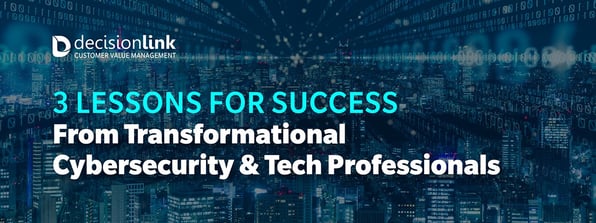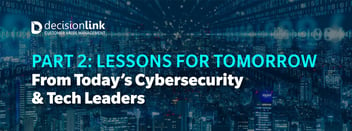3 Lessons for Success From Cybersecurity & Tech Professionals

While the ratio of women in cybersecurity is steadily increasing—around 24% today compared to just 11% in 2011—it’s still far from achieving true gender inclusivity.1 In the first of a three-part webinar series, we talked to a panel of leading industry professionals with diverse backgrounds. They shared the key lessons they’ve learned working in cybersecurity and tech. Their insights are important not only for women seeking to enter cybersecurity and tech, but also for companies wanting to develop, recruit, and retain women in the field. While a number of lessons can be extracted from their discussion, three takeaways stand out:
1. INCLUSIVITY AS A BUSINESS ADVANTAGE
Conditioning and stereotypes that say women and girls are not well-suited to STEM still exist. A TED Talk by Reshma Saujani explains how boys are raised to take risks, while girls are instead raised to be perfect. While this is not a new concept, it is important to recognize that this thinking and difference in upbringing can influence women’s career paths. This traditional view of roles can hinder efforts to recruit women into cybersecurity and tech roles. Likewise, it can affect their opportunities for promotion. While our panelists are clearly powerful and successful in their respective companies, they also have stories of being overlooked or being denied promotions because of assumptions about what they could or could not do. For example, many related being denied positions because it was assumed they would not be able to find harmony between their family and working roles. Instead of being consulted beforehand, advancement decisions were made for them based on these assumptions.
Research shows that gender diversity in the workplace has an intrinsic value for companies’ profitability and productivity.² Diversity and inclusivity positively impacts business operations and should not be regarded as an optics issue. Therefore, it is in tech and cybersecurity companies’ best interests to be aware of the barriers that women and girls face. Putting effort into curating inclusive environments that develop and attract women and girls to STEM is a valuable first initiative.
1 (ISC)² https://www.isc2.org/Research/Women-in-Cybersecurity
2 Harvard Business Review https://hbr.org/2019/02/research-when-gender-diversity-makes-firms-more-productive
2. LEVERAGING VALUE CAN TRANSFORM YOUR BUSINESS PRESENCE
Joanne Moretti, CMO of DecisionLink, cut right to the core of the greatest challenge sales leaders in cybersecurity have: “If you can’t prove your value, you’re not going to get into high margin territory for your company.” With global cybersecurity threats becoming more prevalent, effectively communicating your company’s value is even more critical. In this context, the ability to pivot from technical details to business value communication is a key to sales success and a powerful opportunity for women in the industry. The ability to effectively articulate what your product does well and how it directly benefits your client’s business is a differentiating communications approach. In the past, cybersecurity companies have often focused on features and functions and fear-driven sales strategies. Shifting conversations to value is a compelling way female sales professionals can set themselves and their company apart. And this is a long-term approach that extends into customer success and repeat revenues. According to ProfitWell, companies do not actually profit from initial customer acquisition. Instead, it’s through continued business transactions that real margins are realized. Focusing on value across all interactions allows companies to recoup initial acquisition costs and retain customer trust and commitment.
3. BUILDING VALUE BY BEING A CONNECTOR
A value-based approach to customers is a consultative practice that focuses on relationship building from the outset. To effectively present value, it is essential to evaluate a target’s operational environment and assessing how your solution might map into their existing systems. This kind of relational interaction is an area where women, in particular, can shine. Speaking the language of business provides a powerful opportunity to solve to the business outcome and level the playing field. To showcase value with clients, our panelists recommend to first ask, “What are you solving for? What’s the relatable story you have to tell?” While initial responses may likely focus on threat protection and traditional cybersecurity needs, digging deeper can help uncover where your solutions can add even more significant value. Creating this kind of framework ensures that you have enough understanding to ensure your client gets the right solutions for their situation and knows to look for and assess the value that delivers. Guiding your clients to this kind of more holistic view is important. At its core cybersecurity is a community effort. Women in cybersecurity, especially, have the opportunity to be a connector between various communities. According to Jeanine Banks, Vice President of Products & 3P Developer Platforms at Google, adopting this role can help you communicate value and leverage communities to solve problems and innovate at a rapid pace.
These three tips just scratch the surface of our panelists’ conversation. Watch the full session for more in-depth discussion and additional lessons. You can also hear them deconstruct misconceptions and myths about women leaders in cybersecurity and tech.
GET TO KNOW OUR PANELISTS:

Jeanine Banks is the VP of Products & 3P Developer Platforms at Google and has 20+ years leading global Fortune 500s, start-ups and midsize tech businesses.

Connie Glaspie is the Regional Vice-President of Sales in the Western USA & Canada at ForgeRock and has extensive experience leading data and security teams.

Michele Kopp Konetski is an independent Cybersecurity Go-to-Market Expert and a senior security leader with 15+ years in cybersecurity.

Joanne Moretti is DecisionLink’s current CMO with 30+ years of experience in product management expertise, marketing know-how, and sales excellence.

Georgeanna Westmoreland is the moderator of our webinar and is DecisionLink’s Sales Director.

 ValueCloud
ValueCloud
.png?width=118&height=76&name=Rectangle%20(3).png) ValueCloud Ignite
ValueCloud Ignite
.png?width=92&height=92&name=Rectangle%20(4).png) Free Assessment
Free Assessment
.png?width=100&height=100&name=Rectangle%20(5).png) Watch a Demo
Watch a Demo
.png?width=82&height=96&name=Rectangle%20(6).png) Value Calculator
Value Calculator

.png?width=62&height=51&name=Group%2010%20(1).png) Marketing
Marketing
 Sales
Sales
 Customer Success
Customer Success
 Engage Prospects
Engage Prospects
 Win Deals Faster
Win Deals Faster
 Retain Customers
Retain Customers
.png?width=62&height=62&name=Rectangle%20(8).png) Adopt and Scale
Adopt and Scale
.png?width=54&height=54&name=Rectangle%20(9).png) Cybersecurity
Cybersecurity
 Healthcare
Healthcare
.png?width=54&height=54&name=Rectangle%20(10).png) IT & Software
IT & Software



